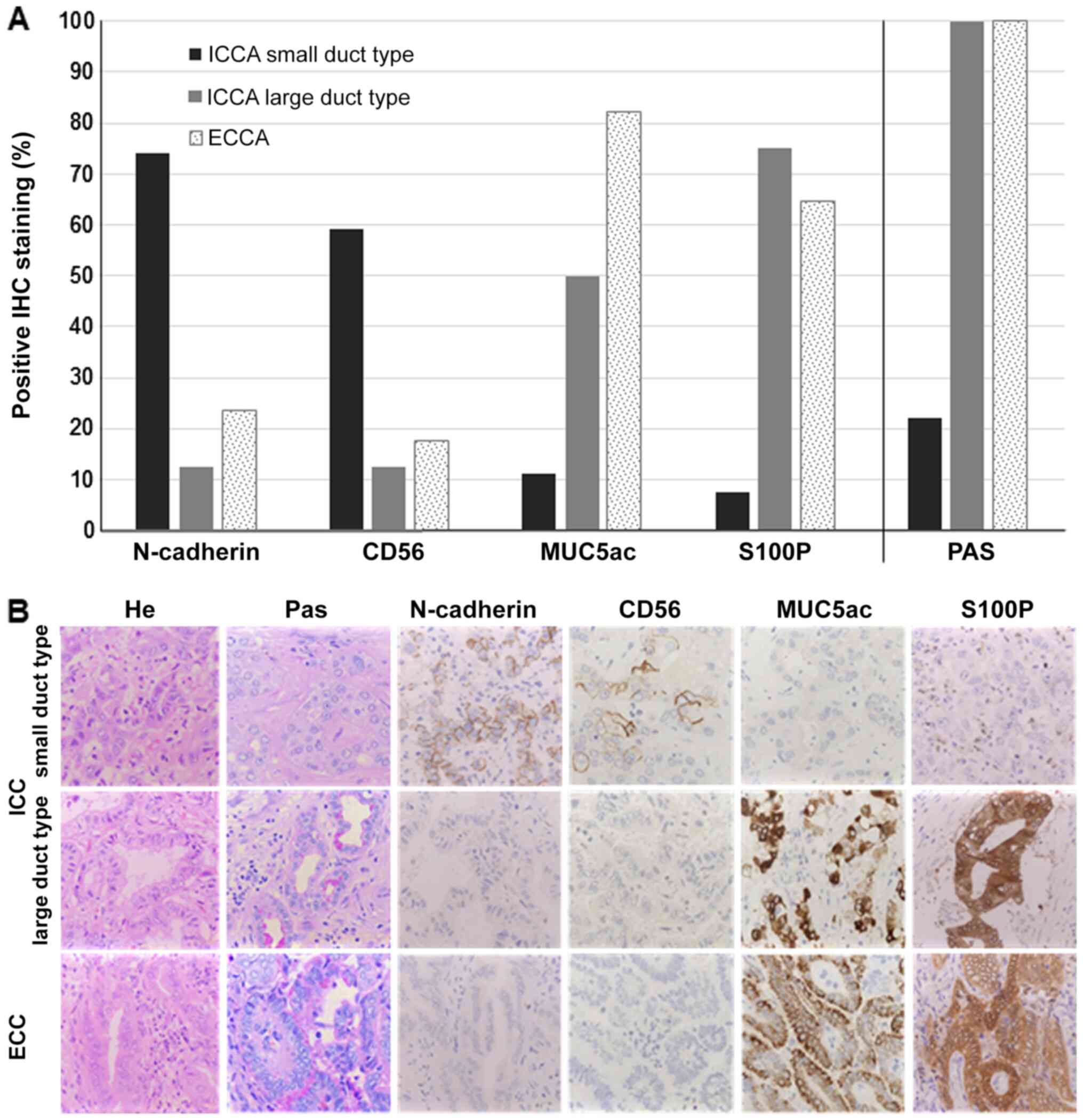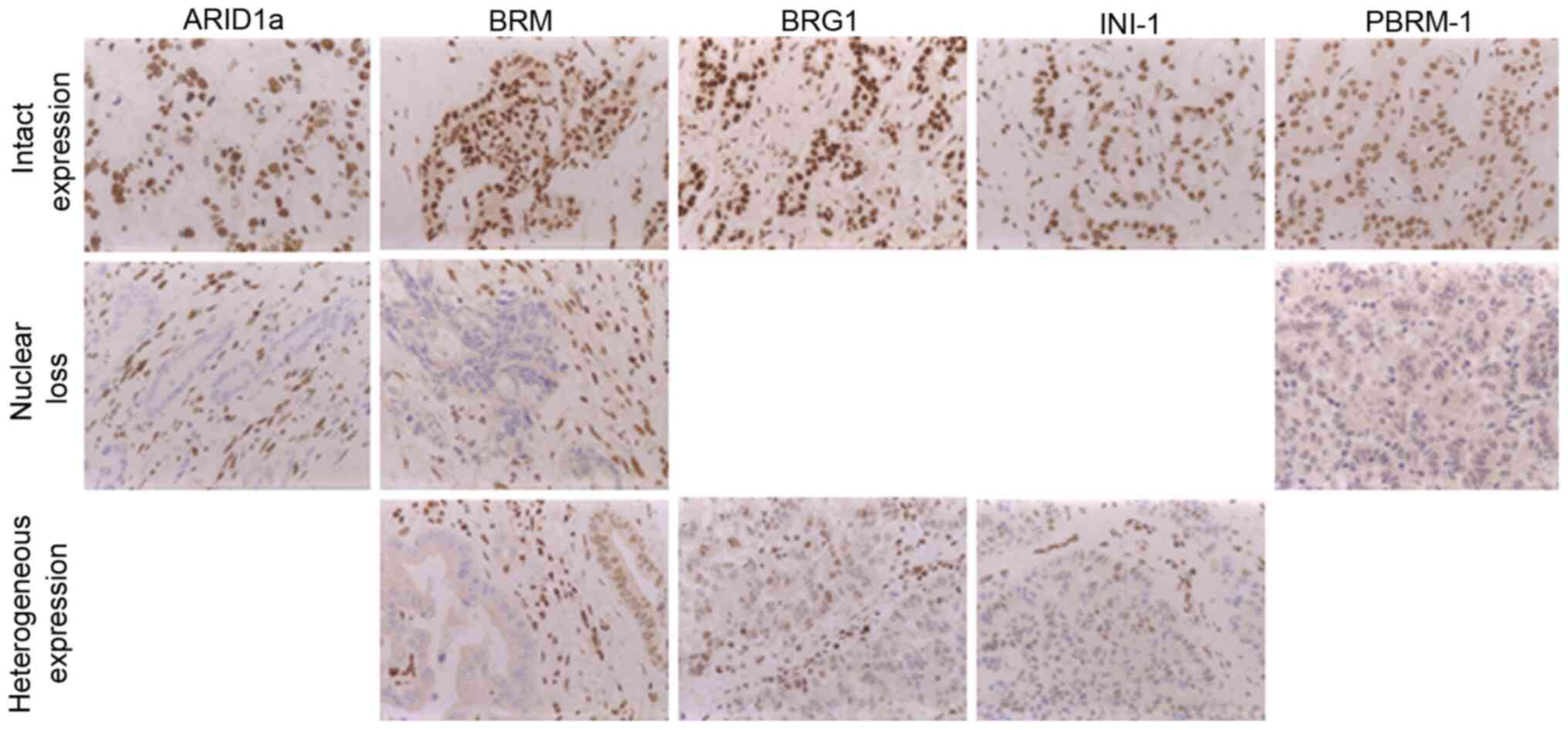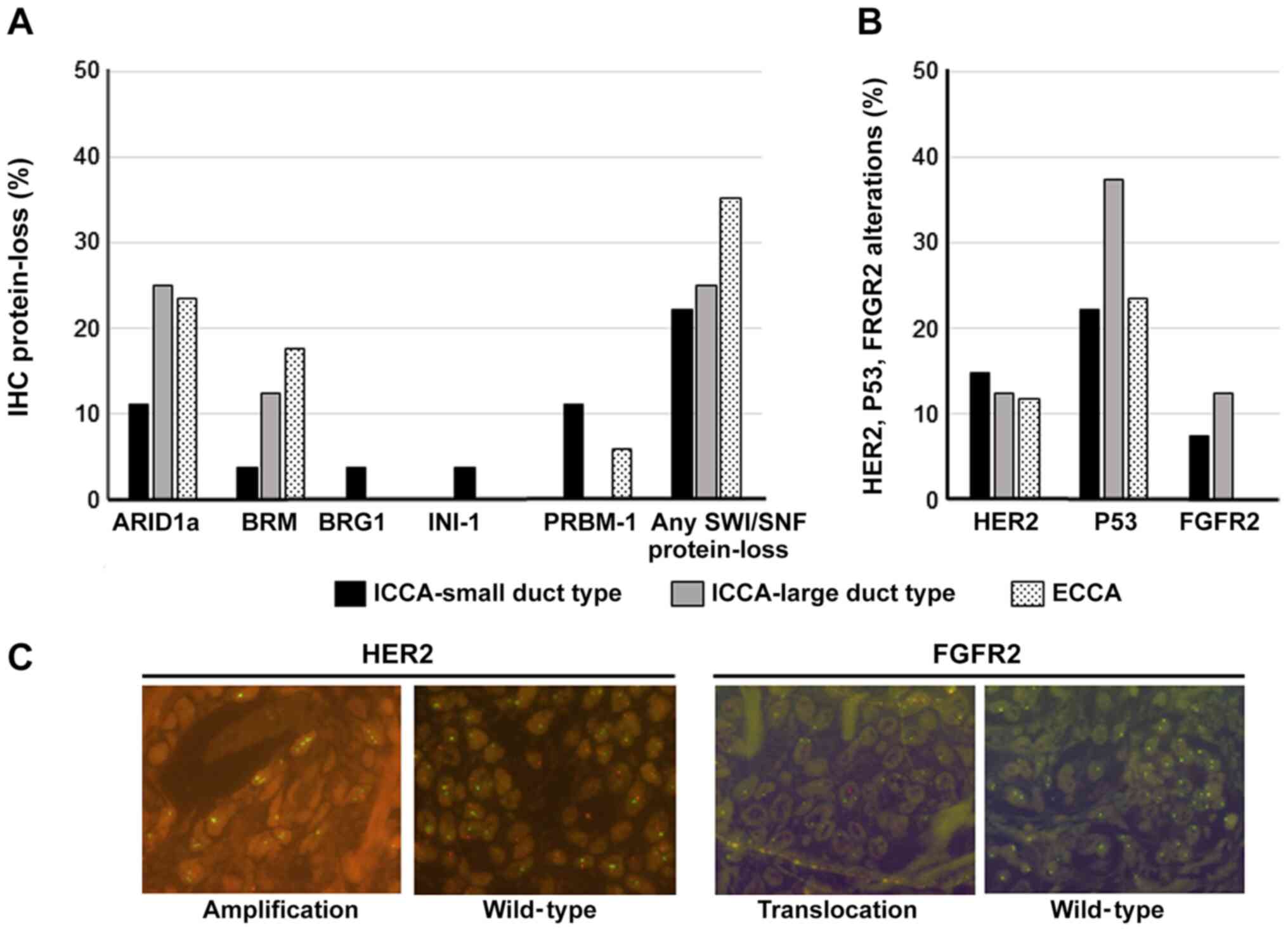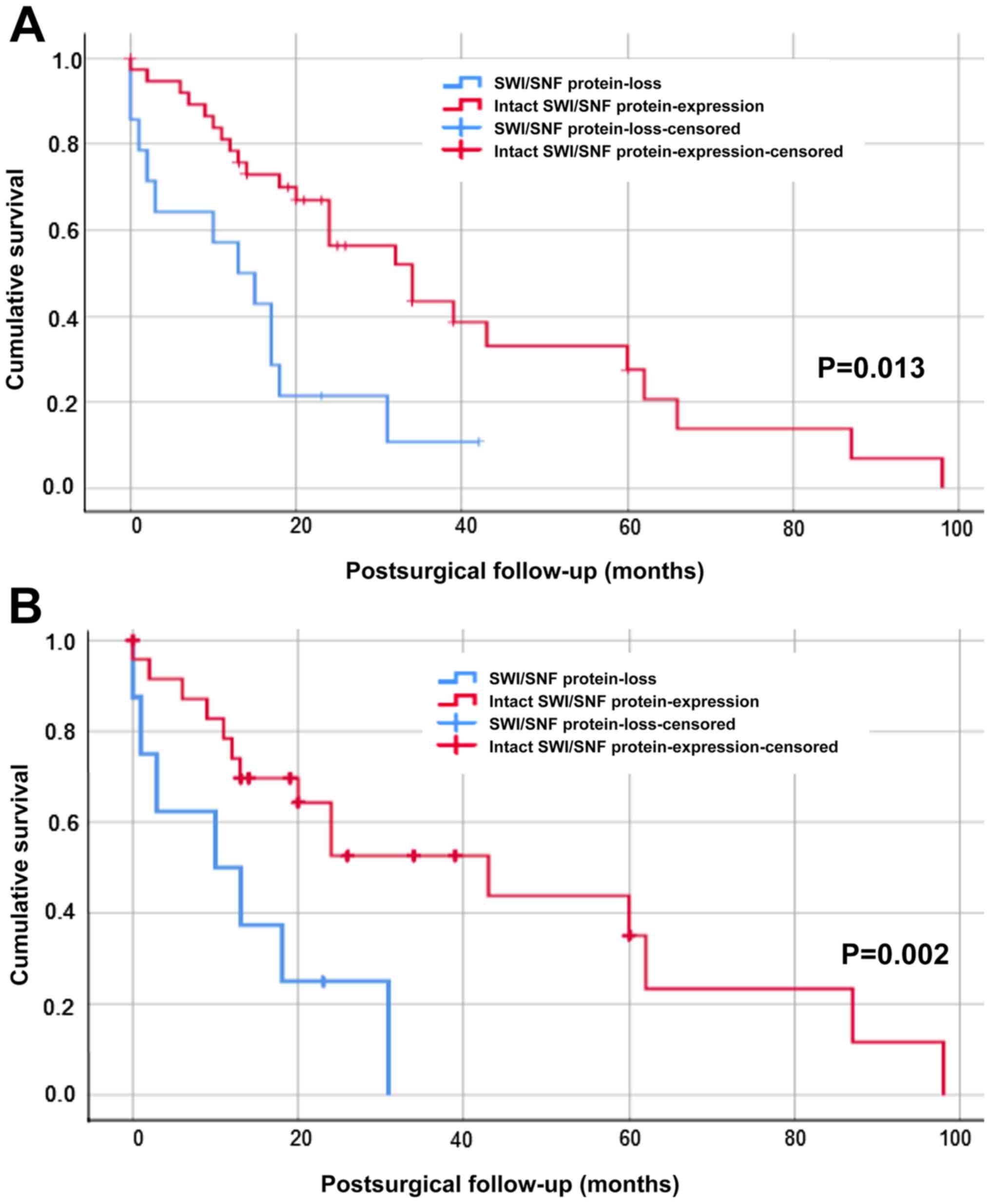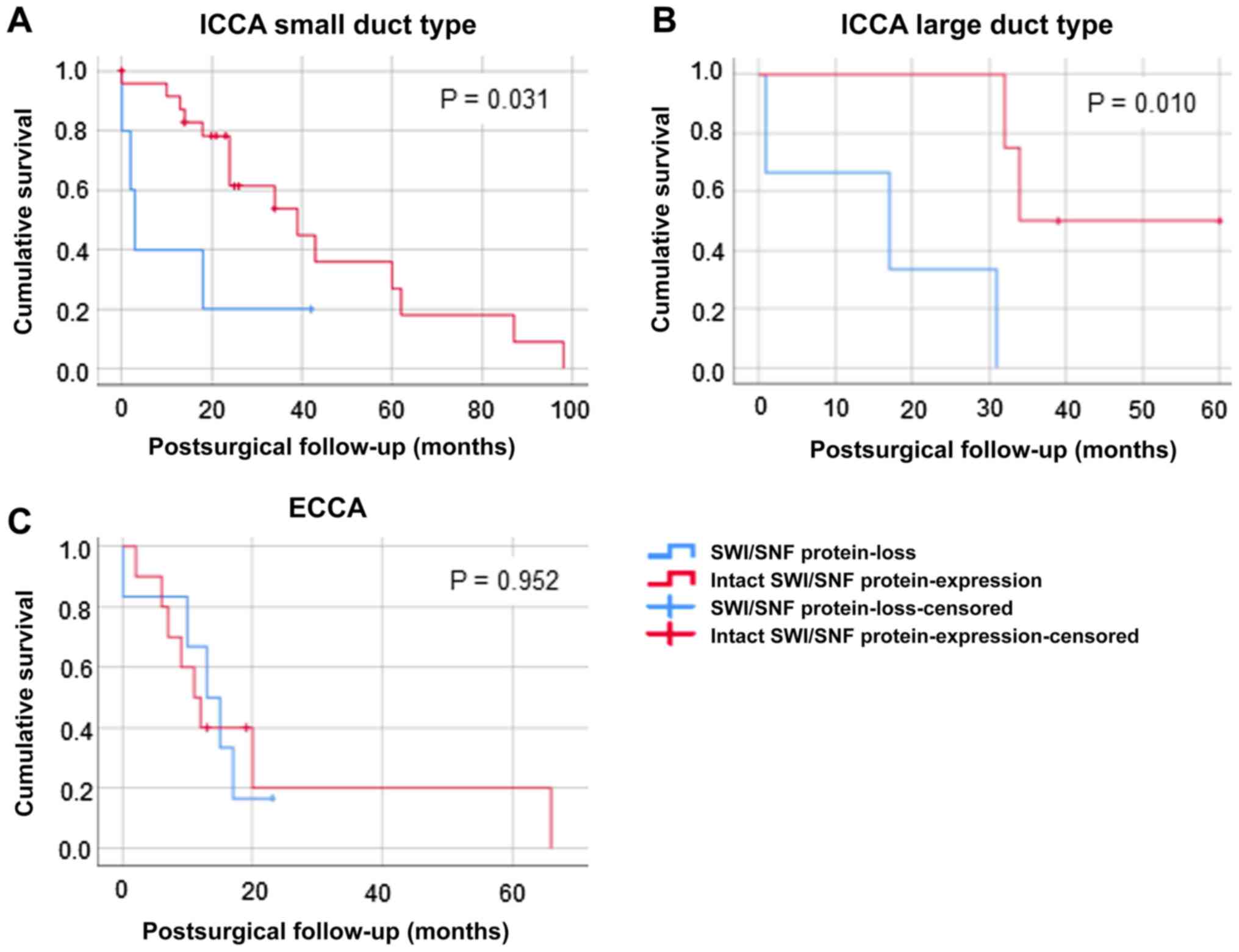|
1
|
Blechacz B, Komuta M, Roskams T and Gores
GJ: Clinical diagnosis and staging of cholangiocarcinoma. Nat Rev
Gastroenterol Hepatol. 8:512–522. 2011. View Article : Google Scholar : PubMed/NCBI
|
|
2
|
Everhart JE and Ruhl CE: Burden of
digestive diseases in the United States Part III: Liver, biliary
tract, and pancreas. Gastroenterology. 136:1134–1144. 2009.
View Article : Google Scholar : PubMed/NCBI
|
|
3
|
Bridgewater J, Galle PR, Khan SA, Llovet
JM, Park JW, Patel T, Pawlik TM and Gores GJ: Guidelines for the
diagnosis and management of intrahepatic cholangiocarcinoma. J
Hepatol. 60:1268–1289. 2014. View Article : Google Scholar : PubMed/NCBI
|
|
4
|
DeOliveira ML, Cunningham SC, Cameron JL,
Kamangar F, Winter JM, Lillemoe KD, Choti MA, Yeo CJ and Schulick
RD: Cholangiocarcinoma: Thirty-one-year experience with 564
patients at a single institution. Ann Surg. 245:755–762. 2007.
View Article : Google Scholar : PubMed/NCBI
|
|
5
|
Rizvi S, Khan SA, Hallemeier CL, Kelley RK
and Gores GJ: Cholangiocarcinoma - evolving concepts and
therapeutic strategies. Nat Rev Clin Oncol. 15:95–111. 2018.
View Article : Google Scholar : PubMed/NCBI
|
|
6
|
Komuta M, Govaere O, Vandecaveye V, Akiba
J, Van Steenbergen W, Verslype C, Laleman W, Pirenne J, Aerts R,
Yano H, et al: Histological diversity in cholangiocellular
carcinoma reflects the different cholangiocyte phenotypes.
Hepatology. 55:1876–1888. 2012. View Article : Google Scholar : PubMed/NCBI
|
|
7
|
Akita M, Fujikura K, Ajiki T, Fukumoto T,
Otani K, Azuma T, Itoh T, Ku Y and Zen Y: Dichotomy in intrahepatic
cholangiocarcinomas based on histologic similarities to hilar
cholangiocarcinomas. Mod Pathol. 30:986–997. 2017. View Article : Google Scholar : PubMed/NCBI
|
|
8
|
Liau JY, Tsai JH, Yuan RH, Chang CN, Lee
HJ and Jeng YM: Morphological subclassification of intrahepatic
cholangiocarcinoma: Etiological, clinicopathological, and molecular
features. Mod Pathol. 27:1163–1173. 2014. View Article : Google Scholar : PubMed/NCBI
|
|
9
|
Aishima S and Oda Y: Pathogenesis and
classification of intrahepatic cholangiocarcinoma: Different
characters of perihilar large duct type versus peripheral small
duct type. J Hepatobiliary Pancreat Sci. 22:94–100. 2015.
View Article : Google Scholar : PubMed/NCBI
|
|
10
|
Nagtegaal ID, Odze RD, Klimstra D, Paradis
V, Rugge M, Schirmacher P, Washington KM, Carneiro F and Cree IA;
WHO Classification of Tumours Editorial Board, : The 2019 WHO
classification of tumours of the digestive system. Histopathology.
76:182–188. 2020. View Article : Google Scholar : PubMed/NCBI
|
|
11
|
Gupta A and Dixon E: Epidemiology and risk
factors: Intrahepatic cholangiocarcinoma. Hepatobiliary Surg Nutr.
6:101–104. 2017. View Article : Google Scholar : PubMed/NCBI
|
|
12
|
Shain AH and Pollack JR: The spectrum of
SWI/SNF mutations, ubiquitous in human cancers. PLoS One.
8:e551192013. View Article : Google Scholar : PubMed/NCBI
|
|
13
|
Schallenberg S, Bork J, Essakly A, Alakus
H, Buettner R, Hillmer AM, Bruns C, Schroeder W, Zander T, Loeser
H, et al: Loss of the SWI/SNF-ATPase subunit members SMARCF1
(ARID1A), SMARCA2 (BRM), SMARCA4 (BRG1) and SMARCB1 (INI1) in
oesophageal adenocarcinoma. BMC Cancer. 20:122020. View Article : Google Scholar : PubMed/NCBI
|
|
14
|
Numata M, Morinaga S, Watanabe T, Tamagawa
H, Yamamoto N, Shiozawa M, Nakamura Y, Kameda Y, Okawa S, Rino Y,
et al: The clinical significance of SWI/SNF complex in pancreatic
cancer. Int J Oncol. 42:403–410. 2013. View Article : Google Scholar : PubMed/NCBI
|
|
15
|
Hodges C, Kirkland JG and Crabtree GR: The
Many Roles of BAF (mSWI/SNF) and PBAF Complexes in Cancer. Cold
Spring Harb Perspect Med. 6:62016. View Article : Google Scholar
|
|
16
|
Simbolo M, Fassan M, Ruzzenente A,
Mafficini A, Wood LD, Corbo V, Melisi D, Malleo G, Vicentini C,
Malpeli G, et al: Multigene mutational profiling of
cholangiocarcinomas identifies actionable molecular subgroups.
Oncotarget. 5:2839–2852. 2014. View Article : Google Scholar : PubMed/NCBI
|
|
17
|
Reisman D, Glaros S and Thompson EA: The
SWI/SNF complex and cancer. Oncogene. 28:1653–1668. 2009.
View Article : Google Scholar : PubMed/NCBI
|
|
18
|
Phelan ML, Sif S, Narlikar GJ and Kingston
RE: Reconstitution of a core chromatin remodeling complex from
SWI/SNF subunits. Mol Cell. 3:247–253. 1999. View Article : Google Scholar : PubMed/NCBI
|
|
19
|
Pulice JL and Kadoch C: Composition and
Function of Mammalian SWI/SNF Chromatin Remodeling Complexes in
Human Disease. Cold Spring Harb Symp Quant Biol. 81:53–60. 2016.
View Article : Google Scholar : PubMed/NCBI
|
|
20
|
Jiao Y, Pawlik TM, Anders RA, Selaru FM,
Streppel MM, Lucas DJ, Niknafs N, Guthrie VB, Maitra A, Argani P,
et al: Exome sequencing identifies frequent inactivating mutations
in BAP1, ARID1A and PBRM1 in intrahepatic cholangiocarcinomas. Nat
Genet. 45:1470–1473. 2013. View
Article : Google Scholar : PubMed/NCBI
|
|
21
|
Simbolo M, Vicentini C, Ruzzenente A,
Brunelli M, Conci S, Fassan M, Mafficini A, Rusev B, Corbo V,
Capelli P, et al: Genetic alterations analysis in prognostic
stratified groups identified TP53 and ARID1A as poor clinical
performance markers in intrahepatic cholangiocarcinoma. Sci Rep.
8:71192018. View Article : Google Scholar : PubMed/NCBI
|
|
22
|
Wilson BG and Roberts CW: SWI/SNF
nucleosome remodellers and cancer. Nat Rev Cancer. 11:481–492.
2011. View
Article : Google Scholar : PubMed/NCBI
|
|
23
|
Helbig D, Ihle MA, Pütz K, Tantcheva-Poor
I, Mauch C, Büttner R and Quaas A: Oncogene and therapeutic target
analyses in atypical fibroxanthomas and pleomorphic dermal
sarcomas. Oncotarget. 7:21763–21774. 2016. View Article : Google Scholar : PubMed/NCBI
|
|
24
|
Simon R, Mirlacher M and Sauter G: Tissue
microarrays. Methods Mol Med. 114:257–268. 2005.PubMed/NCBI
|
|
25
|
Wolff AC, Hammond ME, Hicks DG, Dowsett M,
McShane LM, Allison KH, Allred DC, Bartlett JM, Bilous M,
Fitzgibbons P, et al American Society of Clinical Oncology; College
of American Pathologists, : Recommendations for human epidermal
growth factor receptor 2 testing in breast cancer: American Society
of Clinical Oncology/College of American Pathologists clinical
practice guideline update. J Clin Oncol. 31:3997–4013. 2013.
View Article : Google Scholar : PubMed/NCBI
|
|
26
|
Javle M, Lowery M, Shroff RT, Weiss KH,
Springfeld C, Borad MJ, Ramanathan RK, Goyal L, Sadeghi S,
Macarulla T, et al: Phase II Study of BGJ398 in Patients With
FGFR-Altered Advanced Cholangiocarcinoma. J Clin Oncol. 36:276–282.
2018. View Article : Google Scholar : PubMed/NCBI
|
|
27
|
Khan SA, Taylor-Robinson SD, Toledano MB,
Beck A, Elliott P and Thomas HC: Changing international trends in
mortality rates for liver, biliary and pancreatic tumours. J
Hepatol. 37:806–813. 2002. View Article : Google Scholar : PubMed/NCBI
|
|
28
|
Saha SK, Zhu AX, Fuchs CS and Brooks GA:
Forty-Year Trends in Cholangiocarcinoma Incidence in the U.S.:
Intrahepatic Disease on the Rise. Oncologist. 21:594–599. 2016.
View Article : Google Scholar : PubMed/NCBI
|
|
29
|
Graham RP, Barr Fritcher EG, Pestova E,
Schulz J, Sitailo LA, Vasmatzis G, Murphy SJ, McWilliams RR, Hart
SN, Halling KC, et al: Fibroblast growth factor receptor 2
translocations in intrahepatic cholangiocarcinoma. Hum Pathol.
45:1630–1638. 2014. View Article : Google Scholar : PubMed/NCBI
|
|
30
|
Wu YM, Su F, Kalyana-Sundaram S, Khazanov
N, Ateeq B, Cao X, Lonigro RJ, Vats P, Wang R, Lin SF, et al:
Identification of targetable FGFR gene fusions in diverse cancers.
Cancer Discov. 3:636–647. 2013. View Article : Google Scholar : PubMed/NCBI
|
|
31
|
Rao Q, Xia QY, Wang ZY, Li L, Shen Q, Shi
SS, Wang X, Liu B, Wang YF, Shi QL, et al: Frequent co-inactivation
of the SWI/SNF subunits SMARCB1, SMARCA2 and PBRM1 in malignant
rhabdoid tumours. Histopathology. 67:121–129. 2015. View Article : Google Scholar : PubMed/NCBI
|
|
32
|
Sasaki M, Nitta T, Sato Y and Nakanuma Y:
Loss of ARID1A Expression Presents a Novel Pathway of
Carcinogenesis in Biliary Carcinomas. Am J Clin Pathol.
145:815–825. 2016. View Article : Google Scholar : PubMed/NCBI
|
|
33
|
Luchini C, Robertson SA, Hong SM,
Felsenstein M, Anders RA, Pea A, Nottegar A, Veronese N, He J,
Weiss MJ, et al: PBRM1 loss is a late event during the development
of cholangiocarcinoma. Histopathology. 71:375–382. 2017. View Article : Google Scholar : PubMed/NCBI
|
|
34
|
Churi CR, Shroff R, Wang Y, Rashid A, Kang
HC, Weatherly J, Zuo M, Zinner R, Hong D, Meric-Bernstam F, et al:
Mutation profiling in cholangiocarcinoma: Prognostic and
therapeutic implications. PLoS One. 9:e1153832014. View Article : Google Scholar : PubMed/NCBI
|
|
35
|
Sarcognato S, Gringeri E, Fassan M, Di
Giunta M, Maffeis V, Guzzardo V, Cillo U and Guido M: Prognostic
role of BAP-1 and PBRM-1 expression in intrahepatic
cholangiocarcinoma. Virchows Arch. 474:29–37. 2019. View Article : Google Scholar : PubMed/NCBI
|
|
36
|
Misumi K, Hayashi A, Shibahara J, Arita J,
Sakamoto Y, Hasegawa K, Kokudo N and Fukayama M: Intrahepatic
cholangiocarcinoma frequently shows loss of BAP1 and PBRM1
expression, and demonstrates specific clinicopathological and
genetic characteristics with BAP1 loss. Histopathology. 70:766–774.
2017. View Article : Google Scholar : PubMed/NCBI
|
|
37
|
Shen J, Peng Y, Wei L, Zhang W, Yang L,
Lan L, Kapoor P, Ju Z, Mo Q, Shih IeM, et al: ARID1A Deficiency
Impairs the DNA Damage Checkpoint and Sensitizes Cells to PARP
Inhibitors. Cancer Discov. 5:752–767. 2015. View Article : Google Scholar : PubMed/NCBI
|
|
38
|
Lee D, Yu EJ, Ham IH, Hur H and Kim YS:
AKT inhibition is an effective treatment strategy in
ARID1A-deficient gastric cancer cells. OncoTargets Ther.
10:4153–4159. 2017. View Article : Google Scholar
|
|
39
|
Shen J, Ju Z, Zhao W, Wang L, Peng Y, Ge
Z, Nagel ZD, Zou J, Wang C, Kapoor P, et al: ARID1A deficiency
promotes mutability and potentiates therapeutic antitumor immunity
unleashed by immune checkpoint blockade. Nat Med. 24:556–562. 2018.
View Article : Google Scholar : PubMed/NCBI
|















